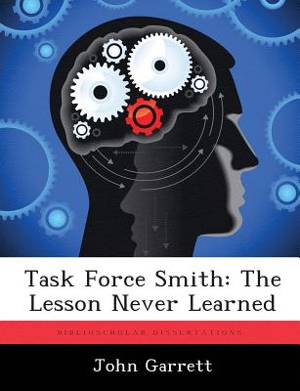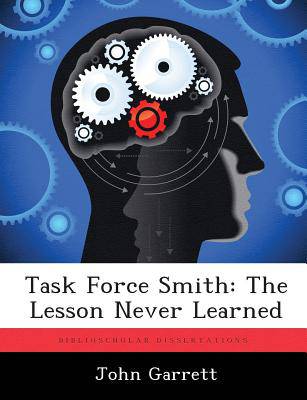
- Retrait gratuit dans votre magasin Club
- 7.000.000 titres dans notre catalogue
- Payer en toute sécurité
- Toujours un magasin près de chez vous
- Retrait gratuit dans votre magasin Club
- 7.000.0000 titres dans notre catalogue
- Payer en toute sécurité
- Toujours un magasin près de chez vous
Description
This monograph explores the often-used phrase "No more Task Force Smiths." This catchphrase is used to express a desire to avoid the perceived mistakes that lead to the defeat of Task Force Smith during the Korean War, July 1950. It deployed and was decimated by the North Korean advance. The defeat has generally been blamed on poor training, poor leadership and poor equipment. The real cause for the failure, however, has been ignored. Task Force Smith was deployed to the Korean Theater without any concept of how and why it was to be employed. During the initial phase of the Korean War, the United States forces were repeatedly thrown into battle against the North Koreans without any real reflection, but under the illusion that it was better to do something than nothing. It was the operational leadership, above Task Force Smith, that was the part of the Army that was the most ill prepared. The leadership of the Army had failed to learn the art of war, or even the doctrine of the period. This monograph explores what happened to Task Force Smith and why. The commonly held misconceptions used by authors to explain the failure are examined and tested by the facts. Then the primary positions held up as responsible for the failure are scrutinized, for instance, training, leadership and un-preparedness. Finally, this paper then endeavors to examine the operational doctrine of the time and the failure of the leadership to understand and use it. The lesson never learned is that the understanding of military science and the operational art, not technology, plays the greatest role in victory or defeat.
Spécifications
Parties prenantes
- Auteur(s) :
- Editeur:
Contenu
- Nombre de pages :
- 62
- Langue:
- Anglais
Caractéristiques
- EAN:
- 9781288323845
- Date de parution :
- 21-11-12
- Format:
- Livre broché
- Format numérique:
- Trade paperback (VS)
- Dimensions :
- 189 mm x 246 mm
- Poids :
- 127 g

Les avis
Nous publions uniquement les avis qui respectent les conditions requises. Consultez nos conditions pour les avis.






